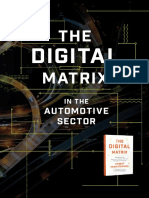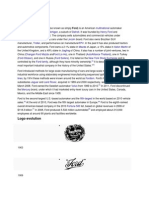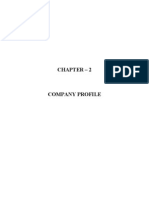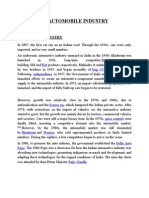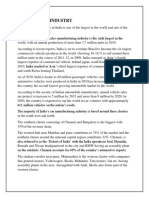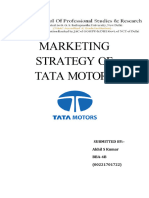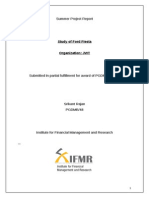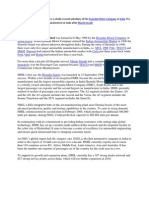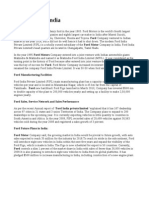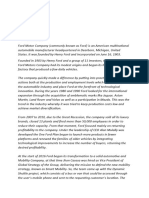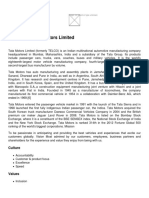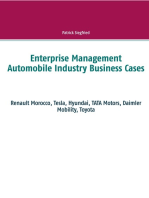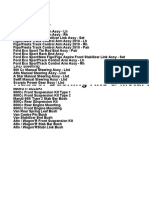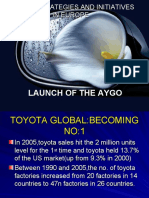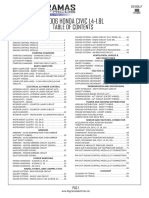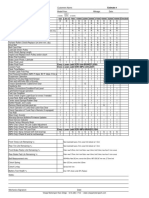0 ratings0% found this document useful (0 votes)
415 viewsFord
Ford
Uploaded by
bhaktishah117India's passenger car and commercial vehicle manufacturing industry is the sixth largest in the world, with an annual production of more than 3. Million units in 2011. In 2009, India emerged as Asia's fourth largest exporter of passenger cars, behind Japan, south Korea, and Thailand. The majority of India's car manufacturing industry is based around three clusters in the south, west and north.
Copyright:
© All Rights Reserved
Available Formats
Download as DOCX, PDF, TXT or read online from Scribd
Ford
Ford
Uploaded by
bhaktishah1170 ratings0% found this document useful (0 votes)
415 views97 pagesIndia's passenger car and commercial vehicle manufacturing industry is the sixth largest in the world, with an annual production of more than 3. Million units in 2011. In 2009, India emerged as Asia's fourth largest exporter of passenger cars, behind Japan, south Korea, and Thailand. The majority of India's car manufacturing industry is based around three clusters in the south, west and north.
Original Title
ford.docx
Copyright
© © All Rights Reserved
Available Formats
DOCX, PDF, TXT or read online from Scribd
Share this document
Did you find this document useful?
Is this content inappropriate?
India's passenger car and commercial vehicle manufacturing industry is the sixth largest in the world, with an annual production of more than 3. Million units in 2011. In 2009, India emerged as Asia's fourth largest exporter of passenger cars, behind Japan, south Korea, and Thailand. The majority of India's car manufacturing industry is based around three clusters in the south, west and north.
Copyright:
© All Rights Reserved
Available Formats
Download as DOCX, PDF, TXT or read online from Scribd
Download as docx, pdf, or txt
0 ratings0% found this document useful (0 votes)
415 views97 pagesFord
Ford
Uploaded by
bhaktishah117India's passenger car and commercial vehicle manufacturing industry is the sixth largest in the world, with an annual production of more than 3. Million units in 2011. In 2009, India emerged as Asia's fourth largest exporter of passenger cars, behind Japan, south Korea, and Thailand. The majority of India's car manufacturing industry is based around three clusters in the south, west and north.
Copyright:
© All Rights Reserved
Available Formats
Download as DOCX, PDF, TXT or read online from Scribd
Download as docx, pdf, or txt
You are on page 1of 97
1
BRCM COLLEGE OF BUSINESS ADMINISTRATION
SURAT
Summer training project
T.Y. BBA Semester 5
III Division
2
TITLE PAGE:
COMPANY CERTIFICATE:
COLLEGE CERTIFICATE:
DECLARATION:
3
INTRODUCTION
CHAPTER:-1
4
Industry details
The automobile industry in India is one of the larger markets in the world and
had previously been one of the fastest growing globally, but is now seeing flat or
negative growth rates. India's passenger car and commercial vehicle
manufacturing industry is the sixth largest in the world, with an annual production
of more than 3.9 million units in 2011. According to recent reports, India overtook
Brazil and became the sixth
largest passenger vehicle
producer in the world (beating
such old and new auto
makers as Belgium, United
Kingdom, Italy, Canada,
Mexico, Russia, Spain,
France, and Brazil), grew 16
to 18 per cent to sell around three million units in the course of 2011-12. In 2009,
India emerged as Asia's fourth largest exporter of passenger cars, behind Japan,
South Korea, and Thailand. In 2010, India beat Thailand to become Asia's third
largest exporter of passenger cars.
The majority of India's car manufacturing industry is based around three clusters
in the south, west and north. The southern cluster consisting of Chennai is the
biggest with 35% of the revenue share. The western hub near Mumbai and Pune
contributes to 33% of the market and the northern cluster around the National
5
Capital Region contributes 32%. Chennai, with the India operations of Ford,
Hyundai, Renault, Mitsubishi, Nissan, BMW, Hindustan Motors, Daimler, Caparo,
and PSA Peugeot Citron is about to begin their operations by 2014. Chennai
accounts for 60% of the country's automotive exports. Gurgaon and Manesar in
Haryana form the northern cluster where the country's largest car manufacturer,
Maruti Suzuki, is based. The Chakan corridor near Pune, Maharashtra is the
western cluster with companies like General Motors, Volkswagen, Skoda,
Mahindra and Mahindra, Tata Motors, Mercedes Benz, Land Rover, Jaguar Cars,
Fiat and Force Motors having assembly plants in the area. Nashik has a major
base of Mahindra & Mahindra with a UV assembly unit and an Engine assembly
unit. Aurangabad with Audi, Skoda and Volkswagen also forms part of the
western cluster. Another emerging cluster is in the state of Gujarat with
manufacturing facility of General Motors in Halol and further planned for Tata
Nano at their plant inSanand. Ford, Maruti Suzuki and Peugeot-Citroen plants are
also set to come up in Gujarat. Kolkata with Hindustan Motors, Noida with Honda
and Bangalore with Toyota are some of the other automotive manufacturing
regions around the country.
6
Company details
Ford Motor Company, a global automobile industry leader based in Dearborn,
Michigan, manufactures or distributes Ford and Lincoln brand vehicles across six
continents. Ford has approximately 166,000 employees and about 70 plants
worldwide
Ford motor company enter the business
world on June 16, 1903, when henry ford
and 11 businesses associated signed the
companys article of incorporation. With
$28,000 in cash, the pioneering
industrialist gave birth to what was to
become one of the worlds largest corporations. Few companies are as closely
identified with the history and development of industry and society throughout the
20
th
century as ford motor company.
Henry ford insisted that the companys future lay in the production of affordable
cars for a mass market. Beginning in 1903, the company began using the first 19
letters of the alphabet to name new cars, in 1908, the model T was born. 19 year
and 15 million model Ts later.
Ford motor company was a giant industrial complex that spanned the globe, in
1925, ford motor company acquired the Lincoln motor company, thus branching
out into luxury cars, and in the 1930s, the mercury division was created to
7
establish a division centered on mid-priced cars.
Ford motor company was growing.
In the 50s came the thunderbird and the
chance to own a part of ford motor company.
The company went public and, on feb.24, 1956
had about 350,000 new stockholders. Henry ford lls keen perception of political
and economic trend in the 50s led to the global expansion of FMC in the 60s,
and the establishment of ford of Europe in 1967, 20 years ahead of the European
Economic Communitys arrival. The company established its North American
automotive operations in 1971, consolidating U.S., Canadian, and Mexican
operation more than two decades ahead of the North American free trade
agreement.
Ford motor company started the last century
with a single man envisioning products that
would meet the needs of people in the world
on the verge of high-gear industrialization.
Today, ford motor company is a family of
automotive brands consisting of: ford Lincoln,
mercury, Mazda, jaguar, Land Rover, Aston Martin, and Volvo. The company is
beginning its second century of existence with a worldwide organization that
retains and expands henry fords heritage by developing products that serve the
varying and ever-changing needs of people in the global community.
Ford India established operation in 1995 as a joint venture with Mahindra and
Mahindra. The company commenced operations with an initial quality infusion of
8
US$ 375 million in factory and operation.in march 2005, ford India become a
wholly owned subsidiary of ford motor company after divesting its crossholding
portfolio with M&M. in October 2005, ford India received approval from ford motor
company for an additional equity infusion of US$ 75 million to meet the need of
future plans.
Ford India manufactures and distributes automobiles made at its modern,
integrated manufacturing facility at maraimalai Nagar, near Chennai spread over
350 acres. With over 2300 employees, the companys models in India include the
ford icon, ford fiesta and ford endeavour. Ford India also has an export program
and in 2007 announced its first ever CBU export program of the popular fiesta.
Ford India is embarking on an accelerated export strategy wuth its new small car
and engine which will be exported to markets within the Asia pacific and Africa
region.
The company presently has 164 dealership facilities in 94 cities. Ford India has
been revamping all its dealerships under for Brand@Retail, a global corporate
identity program to offer a world class purchase and ownership experience to
the customer. Ford India provides training support to dealers in areas including
customer satisfaction, sales, technical and non technical aspects of the
business and in the financial management of the dealership.
Ford India has its own branded service and sales initiates, quality care, which
provides car owners with a superior with a superior sales and service experience
at ford dealership nationwide. In addition, ford India has several customer support
and after sales program such as ford service plan and Extended warranty
9
offering to provide its customers stress free vehicle ownership and motoring
experience.
To become the worlds leading company for automotive products and services.
Their mission is to ensure best in class quality, flawless launch and
manufacturing innovations that will ensure that their manufacturing processes are
leading edge, green and sustainable.
History of organization
10
Ford Motor Company is an American automaker and the world's third largest
automaker based on worldwide vehicle sales. Based in Dearborn, Michigan, a
suburb of Detroit, the automaker was founded by Henry Ford, and incorporated
on June 16, 1903. Ford Motor Company would go on to become one of the
largest and most profitable companies in the world, as well as being one of the
few to survive the Great Depression. The largest family-controlled company in the
world, the Ford Motor Company has been in continuous family control for over
110 years. Ford now encompasses two brands: Ford and Lincoln. Ford once
owned 5 other luxury brands; they were Volvo, Land Rover, Jaguar, Aston Martin
and Mercury. But over time those brands were sold to other companys and
Mercury was discontinued.
11
Location of offices
Headquarter Of ford:
Address:
Ford Motor Company World Headquarters
1 American Road
P.O. Box 6248
Dearborn, Michigan 48126-2798
United States
12
Country Type Name
India assembly Chennai Assembly - Ford India Private
Limited
Engine Chennai Engine - Ford India Private Limited
Branches & factories
Ford Car Dealers in Surat
King Ford
Address: Opp. Goverdhan Haveli, Next to Big Bazaar, Piplod
Dumas Road Surat, Gujarat 395007
13
Ford India Car Dealers in India
Regional Office in the North
Ford India Pvt.Ltd.
Tower A, Ground Floor,
Unitech Cyber Park,
Greenwood City,
Sector 39,
Gurgaon - 122001
Haryana
Regional Office in the South
Ford India P Ltd.
Block - 1B, 1st Floor
RMZ Millenia Business Park
143, Dr MGR Road,
North Veeranam Salai,
Perungudi, Chennai - 600 096
Regional Office in the East
Ford India Pvt Ltd.
55/55/1, Chowringhee Road,
Chowringhee Court,
14
Unit 33, Second Floor,
Opp. Nehru Children Museum
Kolkata - 500 071
Regional Office in the West
Ford India P Ltd.
301, Central Plaza
CST Road, Kalina
Santacruz (E)
Mumbai - 4000
15
Financial high-light & recent financial performance
Mid-decade outlook
Wholesale Volumes About 8 million
Revenue / Pricing Improving
Automotive Operating Margins
- North America 8 - 10%
- Global 8 - 9%
Ford Credit Return on Equity Low Double Digits
Capital Spending About $6 billion
Total Automotive Debt About $10 billion
Investment Rating Plan to achieve investment
Grade in the near term and
To remain investment grade
Through economic cycle
Dividends (Pct. of PAT) Appropriate level of after-
Tax earnings
Details of promoters & owners
16
Alan Mulally - CEO of ford motor company
Michael Boneham President of ford
1. Alan Mulally
Alan Roger Mulally (born August 4, 1945) is an
Americanengineer and business executive who is the
President and Chief Executive Officer of the Ford Motor
Company. Ford, which had been struggling during the
late-2000s recession, returned to profitability under
Mulally and was the only American major car
manufacturer to avoid a bailout fund provided by the
government. Mulally's achievements at Ford are chronicled in the book, "An
American Icon: Alan Mulally and the Fight to Save Ford Motor Company" by
Bryce G. Hoffman published in 2012.
Mulally was the executive vice president of Boeing and the CEO of Boeing
Commercial Airplanes (BCA). He began his career with Boeing as an engineer in
1969 and was largely credited with BCA's resurgence against Airbus in the mid-
2000
2. Michael Boneham :
17
A veteran in the automotive industry
with more than 20 years of
experience, Michael Boneham took
over as Ford India's president and
MD in June last year. He has held a
number of senior international
manufacturing positions within Ford Motor Company in the past. Boneham
tactfully tapped the growth potential of India's flourishing small car segment,
wherein Ford had no presence, and brought out the Figo.
18
Organization structure of the company
Sales consultant
Team Leader (Bhavesh sukhediya)
Generl manager(Jitendra sharma)
Sales manager corporate
(Nevilbhai vakawala)
Sales manager Retail
CEO
(Mr Thomas Anthony)
Dealer principal
(Mr yogendrabhai jadeja)
19
Future plans of organization
Our plan is simple - we are committed to working together to
build vehicles that are green, safe, smart and have the high
quality standards which our customers are expect.
Our plan also includes building on our competence in our plan also includes
building on our competence in hybrid vehicles. And vehicles $14 billion
investment on advance billion investment on advance technologies to improve
fuel efficiency by over technologies to improve fuel efficiency by over 25%.its
also included,
Accelerate development of new products our customers want and value
Finance our Plan and improve balance sheet
Work together effectively as one team -- leveraging our global assets. Pacific
Americas
Africa
20
CHAPTER:-2
MARKETING & SALES
FUNCTIONS
21
Marketing department :
This department concentrates on making sure that there are enough cars to
satisfy Ford customer needs. This department makes sure that the customer
requirements are meant in every Ford car product. This department will also
help the promotion and advertising of new car products.
Sales department
The sale department focuses on the sale of the car i.e. how much the cars
are going for etc. Also the sales department helps ford organization
customers with a variety of ways of buying the cars for example if a customer
wanted to buy a car but the different of ways which the customer can pay is
simple from monthly payments to weekly payments
Connections between these two departments:
Sales and Marketing departments:
The similarities which these departments have are that the sales department
will need the marketing departments to find out what people are willing to buy
ford products. And intern the marketing department will look at the sales
departments to find out the price which will suitable for a product i.e. a car
called a Ford focus before its made will need to go through the process of
collecting data from the marketing departments which will add any customer
needs which the car needs to acquire. The sale department plays the part of
predicting what the price the car would go for when the feature and materials
are bought et
22
Types & classification of product & their sales volumes
1. Figo hatch back (2 boxes car)
2. Ford classic sadan (3 boxes car)
3. Ford fiesta - Luxurious sadan
23
4. Endeavour -SUV (Sport utility vehicle)
Sales in India,
Model Feb 2012 Jan 2013 Feb 2013
Figo 6546 5240 3804
Fiesta classic 1389 723 503
New fiesta 77 68 63
Endeavor 23 31 120
Total sales 8035 6062 4490
24
Sales In king ford,
Model Sales volume ( monthly)
Figo hatch back 70 80
Ford classic sadan 25 30
Ford fiesta - Luxurious sadan Near about 10
Endeavour -SUV (Sport utility
vehicle)
Near about 4 5
Details of competitors
25
Chevrolet
TATA
Hyundai
Nissan
Renault
Mahindra
Volkswagen
Skoda
Honda
2009 Ford Escape with better highway fuel economy than Toyota RAV4
and Honda CRV.
2009 Ford F150 with class leading fuel economy better than Toyota
Tundra and Nissan Titan.
2010 Ford Fusion HEV with bsetter fuel economy than Toyota Camry HEV
by at least 6 mpg.
2010 Ford Fusion with better highway fuel economy than Toyota Camry
and Honda Accord.
2011 Ford Explorer with better highway fuel economy than Toyota
Highlander HEV.
2011 Ford Fiesta with better highway fuel economy than Toyota Yaris and
Nissan Versa.
26
Unique feature of various products of company
1. Figo :
A change for everyone
Kinetic design
Bluetooth connectivity
A change for everyone:
Bold, enigmatic and a head turner, the all new Ford Figo is ready to hit the roads.
Kinetic Design, intelligent features like Bluetooth and best-in-class Ride and
Handling, make it a smart choice for your daily tussle with the road.
Kinetic Design:
27
The large hexagonal lower grille, sloping roofline, big day-light opening and sculpted
side panels give the Figo its signature look. Adding to this, the planted, sure footed
stance and wide, muscular look inspire confidence and imply safety.
Bluetooth Connectivity
Stay connected while on the move with the new Ford Figo and hit the roads carefree.
Simply pair your Bluetooth mobile with the audio unit and start a conversation.
Pair up to 4 phones and access full phone book, dialed numbers, received &
missed calls on the audio display.
You can mute the call, switch to Privacy Mode, get second Call Alerts and
SMS Alerts without reaching for your phone.
You can also stream music from your phone.
2. Classic :
Styling
ORVM
Front Fog Lamps
Alloy Wheels
28
Fun to drive
Performance
Technology
Styling
The Ford Classic's sense of purpose and powerful appearance makes a bold and
strong statement with electrically operated ORVMs, sleek upholstery and integrated
fog lamps.
ORVM
The new Classic Titanium comes with electrically operated ORVMs with turn
indicators that are beautifully crafted into the mirror cowls.
29
Front Fog Lamps
The fog lamps are integrated smartly in the front bumpers which provide better
visibility during foggy conditions.
Alloy Wheels
This car has the new tubeless alloy wheels that provide better road grip and
aesthetic appeal.
30
Fun to Drive
The Bluetooth enabled MP3 player with CD player, an aux-in and 4 speakers lets
you play your favourite track on iPod, phone and more. Another great thing about
this car is as the wind or car noise increases/decreases at higher/lower speed,
Speed Sensing Volume Control automatically adjusts the volume of music or radio, if
it is turned on. Now isnt it smart indeed.
Performance
The performance of any car depends on the capability of its engine. The all new Ford
Classic Titanium is equipped with Duratek petrol engine which gives a mileage of
more than 21Kmpl on road and its Duratorq Diesel engine gives a mileage of more
31
than 32Kmpl. This means that the all new Ford Classic Titanium is highly efficient,
gives great mileage and hence, is very economical.
Technology
Fitted with superior technology such as GEM (General Electronic Module) and PCM
(Power Control Module), the Ford Classic's performance is enhanced in terms of
Low fuel consumption, low emissions, and critical engine diagnostics.
3. Fiesta :
Super Fuel-Efficient 40 Hwy Mpg 2
1.6L Ti-VCT Duratec I-4 Engine
Electric Power-Assisted Steering (EPAS) and AdvanceTrac Stability Control
Available Power Shift Six-Speed Automatic
Ford-Tuned Suspension
32
Super Fuel-Efficient
The SFE Package includes aerodynamic features that minimize air resistance and
help Fiesta deliver unsurpassed-in-its-class Hwy mpg. The package includes side air
deflectors, underbody shields and blockers on the lower grille. The package also
includes a spoiler and 15-inch steel wheels.
1.5L Ti-VCT I-4 Engine
33
With 120 horsepower and 112 lb.-ft. of torque, the standard 1.6-liter twin
independent variable cam timing (Ti-VCT) Duratec I-4 engine is engineered for quick
sprints. The engine block is high-pressure die-cast aluminum for strength and light
weight. Twin independent variable cam timing allows the camshafts to operate both
intake and exhaust valves at different times in the combustion cycle, based on speed
and load. And to further lessen weight, the intake manifold is manufactured from a
composite.
Electric Power-Assisted Steering (EPAS) and AdvanceTrac
Stability Control
Standard features such as electric power-assisted steering (EPAS) and
AdvanceTrac electronic stability control (ESC) contribute to the responsive driving
experience in the Fiesta. EPAS uses speed-sensitive steering and active nibble
control technology, which actively detects and minimizes undesirable rotational
vibration, to help provide feedback and confidence at highway speeds. AdvanceTrac
34
ESC automatically applies the brakes and modulates engine torque whenever it
detects wheelslip. Skidding and fishtailing are avoided by controlling understeer and
oversteer. Additionally, AdvanceTrac ESC helps maintain control under conditions
such as ice, gravel or rain, providing confident stopping power.
Available Power Shift Six-Speed Automatic
its about performance, its about fun. The available class-exclusive dual dry-clutch
Power Shift six-speed automatic delivers performance and fuel efficiency similar to
that of a manual transmission, plus the shift quality and ease of operation provided
by an automatic transmission. Engine torque is delivered to the drive wheels 100
percent of the time for an extra-connected feel. Hill start assist provides improved
drivability on steep inclines. The neutral idle mode helps eliminate drag and
contributes to fuel efficiency. As for maintenance none is required. Fill-for-life
transmission fluid requires no dipstick and is designed to last up to 150,000 miles.
35
Ford-Tuned Suspension
With a standard MacPherson-strut front suspension, 22 mm front sway bar and twist-
beam rear suspension, the 2013 Fiesta is ready to deliver excitement around every
corner. Its standard electric power-assisted steering (EPAS) system is Ford-tuned to
offer refined overall driving dynamics. It works with a software-based technology
called active nibble control to actively detect and minimize undesirable rotational
vibration experienced by drivers, particularly while driving at highway speeds. This
means that with the Fiesta, taking on straightaways will be a smooth affair.
4. Endeavour :
More space for more option
New stylish alloy wheels
Automatic control
4 wheel drive on-the-fly
Revers packing camera
More space for more option
36
The space inside the ford endeavoure is in sharp contrast with the harsh terrain on
the outside.with innovative stowage spaces, refreshed instrument panel and plush
camel interior your ride will be as comfortable as it can be add double folding 2
nd
row
seats and lots of space for tackling those oversized holiday bags and gear, and you
have an off-roader with maxed-out space.
New stylish alloy wheels
Boldly styled and aggressively sized, our 16 chrome plated alloy wheels deliver a
mighty performance on road. Even when standing still they are designed to captivate
onlookers.
Automatic control
37
The automatic transmission transfers all the whopping power from the 3.0L engine to
the wheels effortlessly. With the ford endeavour, ford has employed ultra-modern
technology to create an ultra responsive SUV that converters every last drop of fuel
into the power to get ahead.
4 wheel drive on-the-fly
When the terrain needs talking, just roll up your sleeves and shift to 4x4 mode on the
fly. 4x4 automatic transmission models feature an electric shift-on-the-fly system for
the convenient selection of 2WD or 4WD mode. A proven-tough Borg-warner
transfer case ensure traction is evenly supplied to all 4 wheels, so the powerful ford
endeavour gets you through any tricky spot with the confidence that only a trailblazer
can boast of.
38
Revers packing camera
When youve reach the edge of now here and need to go back on the path you come
on, simply switch to reverse gear and the SATNAV system automatically shifts into
the reverse parking camera mode. Now you dont need to worry about trampling on
the beauty that uncharted territories have to offer.
Customer segmentation & target markets
Pattern of target market:
Customer target market:
Types market Targets
Youngster & joerbber
Figo
Bussinessmen &
propritorship
Classic &
Fiesta
Builders
Endeveour
39
Differentiated marketing :
Distribution net-work
FM radio
Mall advertising (city plus banner)
Full market coverage
M1 M2 M3
P1
P2
P3
40
Sales procedure
2.
Greeting
3
Need
assesment
4.
Vehicle
selection
5.
Product
presentat
6.
Vehicle
demonstr
at
7.
Trade -in
-appraisal
8.
Price
discussion
9.
Financial
Product &
sales
10.
Vehicle
delivery
11.
customer
follow -up
1.
Prospectig
41
Study of how customer orders are processed
Sales order processing is a process where customer orders are received,
checked for creditworthiness then checking for product availability, and
arranging for delivery to customers is done and finally billing and maintaining
records of amounts due from customers is carried out.
It is included following steps:
1. Price
2. Financial discussion of product & service
3. Vehicle delivery
Document related with sales
PAN card
Light bill, tax bill, gas bill (ownership proof)
1.
Price
discussion
2.
Financial
product &
service
3.
Vehicle
delivery
42
Pricing policies
POLICY OBJECTIVE
This policy aims to promote integrated, phased, enduring and self-sustained growth
of the Indian automotive industry. The objectives are to:-
Exalt the sector as a lever of industrial growth and employment and to
achieve a high degree of value addition in the country;
Promote a globally competitive automotive industry and emerge as a global
source for auto components;
Establish an international hub for manufacturing small, affordable passenger
cars and a key centre for manufacturing Tractors and Two-wheelers in the
world;
Ensure a balanced transition to open trade at a minimal risk to the Indian
economy and local industry;
Conduce incessant modernization of the industry and facilitate indigenous
design, research and development;
Steer India's software industry into automotive technology;
Assist development of vehicles propelled by alternate energy sources;
Development of domestic safety and environmental standards at par
withInternational standards
43
CHAPTER:-3
PRODUCTION
MANAGEMENT
44
Detailed organization structure of production department
Production department;-
Production department of the fords cars is basically is what the department do
and focus on. For example if a new car was this is the department where the cars
are being made. Actually this is the manufacturing of the Ford cars.
Manufacturing launched the production team will find the materials needed for the
manufacturing of the new car.
How production plan is prepared from sales plan? how plan is
converted in material requirement plan & ultimately in purchase
plans
All our cars spring to life at Ford's Rs. 1700 crore integrated manufacturing plant at
Maraimalai Nagar, 45 kms. From Chennai. The plant, equipped with advanced
manufacturing technology from Ford, covers 350 acres, provides employment to
about 2,000 people directly and many more thousands indirectly and has a capacity
to manufacture upto 100,000 vehicles per annum. Ford is a 6-Sigma company.
Every step of every process is planned to perfection.
Step 1: STAMPING
45
Semi-automatic press line moulds blank sheets into various body parts.
Thorough checks for perfection in dimensions and surface quality.
Step 2: BODY SHOP
Entire shell checked with military precision for dimensions.
Subjected to stresses to check quality of welding.
Step 3: PAINT SHOP
Cutting-edge technology creates a finish that's unaffected by rain or sunshine.
46
Painting so complete that even underside gets full PVC coating for corrosion
protection.
Baking done to Ford's global paint specifications.
Step 4: T C F
Interiors taken care of, before doors and seats come on in Trim zone.
In Chassis area, professionals use high power tools to fit in engine, front suspension,
bumpers etc.
Once nuts and bolts are tightened to perfection, the car gets its wheels.
Rolls into final line for remaining parts and filling of fluids.
Step 5: QUALITY TESTING
Stringent testing ensures every car is at its best, even in trying conditions.
47
All Ford cars complies with Bharat III emission standards, notified by the
Government of India.
Analysis of plant location considering various factors
Factor affecting plant location:
1.proximity to market
2.availability of raw material
3.infrastructure facility
4.transports facility
5.law and taxation
6.labour community
7.intangible factors
48
Plant lay-out of entire factory showing position of various
departments & buildings
Types & classes of material handling equipment
Automated materials handling systems,returnable pallets and containers designed
for the line as well as an increasing use of information systems that can respond in
short time frames with exacting demands.Without the marriage of materials handling,
packaging and information, the modern automotive supply chain would not be
possible Here, Modern Materials Handlinglooks at the equipment,
informationsystems and best practices that aretransforming the automotive
industryaround the globe.
49
Enter materials handling. When Henry Ford automated the assembly line decades
ago, thats where automation began and ended in the auto industry. The traditional,
risk-free decision was to stay manual because a supplier could always hire or layoff
personnel as business conditions changed, says Dick Montague, director of
industrial sales for FKI Logistexting a world of automated haves and have-nots.
However, as the most successful suppliers and OEMs automate, the laggards are
forced to follow suit or risk falling further behind.
Whats more, some level of automation is required to enable the three most
important best practices in the industry today: lean manufacturing, just-in-time
delivery of parts, and in-line vehicle sequencing, which involves delivering parts to
the line in the same sequence as the cars coming down the line.
All three processes involve a level of error-free synchronization that isnt practical
without automated materials handling and sophisticated information technology.
ROBOTS AND AGVS
Traditional automation in the assembly plant was designed to get an automotive
chassis down the line. As a result, overhead conveyors and a monorail that can
transport an auto in various stages of assembly are commonplace.
Automakers continue to find innovative ways to employ those traditional materials
handling solutions. We have automakers installing floor conveyors for their workers
alongside the assembly line, says Montague. They move at the same speed as the
overhead conveyor so an autoworker doesnt have to walk alongside of the vehicle
to do theirjob.
Other technologies, however, areappearing more frequently in newimplementations.
50
Robots, for instance, are now being used for materials handling and not just spot
welding. Theres a lot of interest in using robots for interprocess handling, that is
passing a part from one process to another, says Joe Campbell, director of strategic
alliances for KUKA Robotics.
As the price of robotics has come down and the reliability gone up, theyre also
being used for palletizing as well as loading and unloading tonnage.
Automatic guided vehicles (AGVs) are also showing up in higher number than ever
before. AGV providers cite a variety of reasons for the increased interest.
Automated carts are used to create a flexible, mobile assembly line that can be
easily reprogrammed when a model or design changes.
51
More reliable than ever, robots are now being used in operations to pass a part
from one process to another and to load and unload damage.
Custom-designed returnable containers anddunnage enable cost-cutting best
practices like lean manufacturing and the in-line sequencing of vehicles and
parts.
52
In-line vehicle sequencing software synchronizes the activities of order
pickers in a facility (left) with the vehicles coming down the assembly line
(right).
The systems ensure that parts are delivered to the line in the same order as
the cars being built.
Inventory control system
At Ford Motor Company inventory management is definitely not a new idea, as
inventory management has some of its developing origins of starting at Ford Motor
Company itself.
Ongoing analyses of both inventory management and manufacturing processes
have led to innovative management systems, such as just-in-time inventory or the
economic-order quantity decision model. Just-in-time inventory is a process
developed by the Japanese based on a process invented by Henry Ford.
53
Henry Ford managed to cut his inventory by forty million dollars by changing how he
obtained materials to produce automobiles. Through a process called vertical
integration, Ford purchased mines and smelting operations to better control the
source and supply of material to produce cars. In this way, he was able to reduce his
standing inventory and increase turnover. In the 1950's, Taiichi Ohno, a mechanical
engineer working for Toyota Motor Co., refined this process into what we know today
as just-in-time inventory.
Just-in-time inventory usually requires a dominant face (or a major partner that has
the resources to start the process and keep it organized and controlled) that
organizes the flow and communication so that all the parties in the supply process
know exactly how many parts are needed to complete a production cycle and how
much time is needed in between production cycles. By having and sharing this
information, Ford Motor Company and its suppliers are able to deliver just the right
amount of product or inventory at a given time. This requires a close working
relationship between all the parties involved and greatly minimizes the amount of
standing or idle inventory.
In the economic-order quantity decision model, an analysis is made to determine
the optimum quantity of product needed to minimize total manufacturing or
production costs. In other words, through a complex analysis, management attempts
to determine the minimum amount of product needed to do the job and still keep the
cost of inventory as low as they possibly can. This analysis considers the amount of
time needed to generate an order, to process, manufacture, organize, and ship each
product, then to receive, put into inventory at a Ford Dealership store, and then sell
54
each product. Lastly is to process the paperwork upon receipt through the final
payment process.
Ford Motor Company, like many companies today employ a mixture of both
processes in order to maintain their independence but still have a close relationship
with suppliers. Ford Dealerships, for example, work closely with Ford Motor
Company to maintain the lowest possible inventories but still have enough cars to
satisfy their customers demand. Ford Motor Company has access to information
about each of its Ford Dealerships inventory levels, this allows management to
further analyze inventories to ensure that each Ford store is carrying the correct
amount of inventory in stock to satisfy that markets needs and maintain minimum
levels.
Inventory valuation method
An inventoryvaluation is a statement which provides information about the value of
goods held in inventory. Goods in inventory can make up a substantial portion of a
company's equity and there is therefore a great deal of interest in the total value of a
company's inventory. This information is reported in financial statements which can
be used internally and externally for a variety of tasks related to accounting, valuing
the company as a whole, and making business decisions
The Ford Motor Company's inventory policy includes two major considerations The
first consideration is inventory cost basis while the second consideration is inventory
composition for valuation With respect to the cost basis for inventory the major policy
choice sare a historical cost value the inventory at initial acquisition cost be
55
replacement cost value inventory at the current market price or some combination of
historical and replacement cost.
Different record kept in store
Header record supplier releasing data
Unique data elements of the supplier release
Reconciliation and release data
Additional requirement
Ford data in supplier release
Release remark section
supplier release trailer record
Material receipt procedure
VDA4905 Weekly Planning Release Message
The VDA4905 is a message, which is sent from a party who is planning the use or
consumption of products to a party who has to plan for the supply of the products.
The message gives the requirements regarding details for medium to long
scheduling for products. The schedule is used to determine raw and fabrication
material authorization. This is based on the terms and conditions defined in a
purchase order or contract.
56
Ford Customer Service Division (FCSD)
The Ford Customer Service Division works on its own internal EDI system and has
different business practices to the Ford manufacturing plants. This requires different
use of some of the data fields in the message layout. FCSD sends only monthly a
VDA 4905 message for A-Class parts (not FCI1-part) and for B-Class parts (slow
movers) only on reorder point considering the agreed lead time. FCI forecasts are as
well advised VDA 4905 formatted (comparable to manufacturing).
Explanation to the Weekly Planning Release for production material and FCSD
(Parts Service) material
1. Basic information of the Weekly Planning Release
1.1 Vendor code
The vendor code has been assigned centrally in the Global Supplier Data Base
(GSDB).
The different vendor codes have now been communised: each vendor code consists
of a four digit base, plus a fifth digit which offers an opportunity to for example -
distinguish different vendor addresses.
Addresses of the vendors shipping plants.
Separate addresses of the vendor for accounting purposes or recipients of the
release authorisations etc.
1.2 Program Release-Number
57
This code which distinguishes each release program has a twofold meaning: the first
three characters (e.g. 660) mark the program month which is common to Ford world-
wide, and the fourth character identifies the interim release runs (660-1, 2,..) which
occur within each program month weekly. The program month has no relation to the
calendar month.
Production material:
The "main-run", i.e. the monthly release calculation, which adds the 6th month, gets
the suffix -1, e.g. 660-1. Within this release calculation requirements will be
generated for each production part.
Releases for e.g. adhesives, greases, oils (so called bulk material) will be generated
only in the second release run ("-2 run).
FCSD
The main release-run, i.e. the monthly release-calculation, which adds one month
requirements, gets the suffix 01, e.g. 660-01.
1.3 Part number
The Ford part number has the following structure:
Prefix right justified 6 characters
Base right justified 8 characters
Suffix left justified 8 characters
58
Please enter the part number on the advice notes and in the advanced shipping note
in the same structure as printed and transmitted on the releases of the destination
plant.
1.4 The receiving plant / Customer Plant Code
All plants of the Ford Companies in Europe are identified by a 2-digit plant-
code.
All data on the release authorisation refer to plant and part number!
The plant is transmitted in record-type 512, field 03 as a 2-digit code.
It is absolutely essential that in every kind of documentation or data
transmission the plant code and the part number are indicated!
A table of plant codes and their address information can be viewed on the
Ford Supplier Portal (FSP) in the Library service section
1.5 book number:
The book number is a classification code for a number of parts, which are assigned
to a Parts Analyst. One analyst can administer more than one book number; they
can be established dependent on receiving plants or identify specific part
commodities. The book number identifies your contact person at Ford for questions
of material scheduling.
The book number is transmitted in record-type 512, field 12 as up to 4-digit code.
1.6 Commitment for fabrication and material authorization
59
The release authorization for fabrication and raw material will be generated for each
production part.
Purchase Parts
For each part it is defined in the purchase order, for how many weeks Ford will
acknowledge the commitments. Generally the commitment is
3 weeks fabrication authorization
9 weeks material authorization
This means that the fabrication authorization of 3 weeks is included in the material
authorization of totally 9 weeks (3 week plus further 6 weeks = 9 week material in
total).
Deviating commitment terms must be negotiated with purchase and documented in
the purchase order.
Primary Metal
Primary Metal has usually a material authorization of the rest of the current month
plus one month.
FCSD
For each part it is defined in the purchase order/release, for how many weeks FCSD
will accept the commitment, e.g.
4 weeks fabrication authorization
8 weeks material authorization
60
This means that the fabrication authorization of 4 weeks is included in the material
authorization of totally 12 weeks, e.g.:
Fabrication authorization 4 weeks
Material authorization further 8 weeks = total 12 weeks
1.7 Part related data remarks
CMMS3 allows the input of plant-part number related data by the Material Control
Analyst. For this purpose 20 positions are reserved in the remarks section, which will
be transmitted from 21 position of the third text string (record type 518, field 05).
FCSD
In the FCSDs parts master file the supplier's part number is maintained in a special
field. The transmission of this supplier's part number (for which Ford will not take any
responsibility) is also performed in the 3rd text-string starting from position 01.
1.8 Plant / Supplier related remarks
With these general remarks Ford draws attention to special plant related conditions,
e.g.:
"Receiving closed at..."
"No delivery at..."
"Plant shut-down from...to.
These remarks are transmitted in the second text-string (40 characters) and in the
first 20 characters of the third text-string.
61
1.9 FCSD FINIS-Code
The Ford Parts Service Depots are working in their internal systems additionally to
the Ford part number with a numeric identification. This is a code with a length of 7
characters. This code should also be mentioned on all delivery documents to the
Parts Service Depots.
As the VDA standard does not contain a code for this, we selected a field of the
standard, which is not used by Ford. It is the field order number in record-type 512,
pos. 10. It contains data only for releases with FCSD plant codes.
1.10 Over-/ under delivery
O/U quantities will not be transmitted in a separate field. Quantities will be
accumulated in the first segment.
1.11 Quantity per load unit
Production material
The "quantity per load unit" will be transmitted in record-type 517, field 05. The
packaging code cannot yet be made available.
FCSD
The detailed package conditions are subject of the purchase order, resp. the
package specification. This record type 517 is currently not used by FCSD-E.
1.12 Data of the last delivery
62
The Advice Note data, Advice Note Number, date, quantity, cum shipped (cum
shipped calculated in Ford CMMS3 system) will be transmitted according to the
VDA-standard with record-type 513, fields 03-07.
Date, quantity, cum shipped refer to the latest recorded transaction in CMMS3; this
may not always be the last receipt, as long as further material is still in transit.
1.13 Release Run
Production material
For every part and every vendor we generate releases on a weekly base.
95 % of all releases are sent straight from the Data Centre into the supplier's mailbox
even though all releases are generally subject to control of the parts analyst. The
parts analyst decides if he wants to control the releases prior to the transmission in
order to amend them, if required.
The CMMS3 Releasing System enables the Material Control Analyst to amend
supplier releases on-line on his terminal. This can happen any day. To identify
amended releases the seventh position of release-numbers is added with an A on
the suffix.
FCSD
All releases are calculated automatically.
For every A-Class respectively forecast parts FCSD generates releases on a
monthly base. Visteon plants and non-European suppliers get releases also on a
monthly base, but the requirements within the agreed fixed lead-time are shown as
weekly requirements.
63
1.14 Data Transmission
Weekly Planning Release
Regularly the weekly planning release will be transmitted once a week.
Occasionally we encounter problems in the process of the release calculation, which
demand that a release-run has to be repeated. In such a case of any problems which
may be based on technical issues or on BoM problems we are able to issue an
additional release run. The program number will show in addition to the normal
program number a letter.
Material issue procedure, document related with material issue &
receipt, purchase procedure
Use of the analysis
Review of the analysis
Prioritization of the Issues
Identification of Material
Business Issues
64
1. Identification of Material Business Issues
We developed a list of more than 500 issues, grouped into 15 topics. The issues
were identified by reviewing Ford business documents as well as comments from
employees, dealers and our major external stakeholders: customers, communities,
suppliers, investors and NGOs. For the Ford analysis, the documents included Ford
policies, business strategy and performance tracking tools, and the Annual Report
on Form 10-K. To represent stakeholder views, we looked at Ford-specific inputs like
summaries of stakeholder engagement sessions as well as documents that
represent stakeholder views more broadly, such as the Global Reporting Initiative G3
Guidelines, the Ceres Roadmap to Sustainability and reports from socially
responsible and mainstream investors.
2. Prioritization of the Issues
We noted the frequency with which issues were raised in the source documents and
rated each issue as low, moderate or high for current or potential impact on the
Company in a three- to five year timeframe, and degree of concern to stakeholders
(by stakeholder group). For each issue, the ratings were averaged separately for
Ford and stakeholders (with extra weight assigned to investors and multi-stakeholder
inputs, as they are key audiences of our reporting). The issues and their ratings were
then plotted on a materiality matrix.
We consider the issues in the upper-right sector to be the most material. None of the
issues is unimportant; the position of each in the matrix simply represents our
understanding of its relative importance to the Company and its stakeholders.
65
3. Review of the Analysis
The draft matrix was reviewed internally. It was then reviewed and revised again
based on a meeting of a Ceres stakeholder committee that included representatives
of environmental and other NGOs, socially responsible investment organizations and
a supplier company.
4. Use of the Analysis
We have used this analysis to identify issues to cover in our reporting and as an
input to our sustainability strategy development. This analysis, and the methods for
conducting materiality analyses generally, is works in progress. Sustainability issues
are not discrete. Rather, they overlap and interconnect in a complex system that is
difficult to capture in a list of issues. Analysing issues by stakeholder group adds
depth to our understanding of who is concerned about which issues and why, but in
the process of placing them on a two-dimensional matrix, some of that nuance is
lost. Finally, an element of subjectivity is inevitable.
Maintenance planning system
TRAVELLING WELL WITH FORD MAINTENANCE PROTECTION PLAN (FMPP)
Customer buying peace of mind when they purchase or lease a quality Ford product
customer want their ownership to be satisfying and pleasurable and so do ford!
Thats why ford provide Genuine Ford Parts & Service. Their new vehicle is backed
by a 3 year/60,000 kilo meter (whichever occurs first) New Vehicle Basic Warranty.
66
To add to your peace of mind and help protect your investment beyond your New
Vehicle Basic Warranty, youll be travelling well with a Ford Maintenance Protection
Plan (FMPP) or a Ford Maintenance Protection Plan Plus! (FMPP Plus!) prepaid
maintenance for the road ahead.
CONFIDENCE FOR THE ROAD AHEAD
FMPP and FMPP Plus! Plans cover all required scheduled maintenance for
Ford vehicles, as outlined in your vehicles Customer Information Guide or
Owners Guide (Owners Guide Diesel Supplement for Ford Power Stroke
Diesel engine vehicles).
FMPP and FMPP Plus! Plans are available with scheduled maintenance
intervals every 6 months/8,000 kilometers, 6 months/12,000 kilometers, 6
months/16,000 kilometers or 12 months/16,000 kilometers.
All maintenance and wear item replacements are made with Ford approved
parts.
FMPP and FMPP Plus! includes coverage for 8 wear items as required, due
to failure caused by normal wear or defect
REGULAR MAINTENANCE OF VEHICLE WILL HELPENSURE OPTIMUM
PERFORMANCE YEAR AFTER YEARSCHEDULED MAINTENANCE AND
WEAR ITEMS.
67
Quality control system
Our customers satisfaction is essential to our future success. Therefore, the quality
of our products and services must be our number one priority today and tomorrow.
At Ford Motor Company Quality is Job 1.
It is of vital importance that we consistently deliver continually improving results in
terms of customer satisfaction with our products and services. Process and people
have and will always be the keys to achieving these results. The principles outlined
below must be relentlessly applied in our day-to-day actions.
The Customer defines Quality - Our customers want products and services that
throughout their lives meet their needs and expectations at a cost that represents
value.
The Quality Operating System - Built on our standards and procedures, the
Quality Operating System defines the key processes in terms of deliverables
necessary to achieve results. It is the disciplined execution and continual metric-
driven improvement of these processes that allow us to eliminate waste and deliver
value. Quality objectives must be met. Quality standards must be set, respected and
achieved. Processes must consistently be followed.
People - Employees, suppliers and dealers must be engaged to sustain and
improve quality performance. Creating an environment of mutual respect and trust
facilitates communications, teamwork and the quality execution of our processes.
Our employees must have the necessary skills and tools to serve as a role model for
process discipline and lead the processes that provide the highest value products
and services.
68
The Use of Metrics and Data Decision making,
objective setting and problem resolution are the links that
focus the strength of our people and processes on
continually improving our products and services.
This policy letter provides the foundation to ensure a
commitment to continually improve the process and performance results of our
metric-driven Quality Operating System. Additionally, as a global citizen serving
global customers, Ford Motor Company through this Policy Letter will help ensure
that we meet or exceed the requirements of applicable international standards
related to our products and services. Adherence to this policy will assure that we
continue to provide our customers with the highest value products and services
possible, ensuring our future and our success.
TQM and Ford Motor Company:
Ford Motor Company total quality management or TQM practices started in the
1980s when Quality Is Job 1 was their slogan. How did TQM work at Ford and are
they still standing behind this process? TQM at Ford Motor CompanyToday at Ford
Motor Company, their most popular slogan is Ford Has a Better Idea. Back in the
1980s when Ford Motor Company total quality management practices were vast, the
slogan of Quality Is Job 1 made more sense.
69
In a conversation with Dan Dobbs, a Six Sigma Master Black Belt at Ford, it was
noted that TQM may have worked in the 1980s, but Six Sigma is the project
management methodology of choice these days.
When TQM, a process improvement methodology based on a customer satisfaction
quality-driven process with guidelines set by management was first utilized, it started
through a joint venture.
Through a partnership with ChemFil, a division of PPG Industries, Ford wanted to
produce better quality products, a stable work environment for the workforce,
effective management, and profitability; all by the 1990s, Quality is Job 1 became
Quality People, Quality Products.
70
CHAPTER:-4
FINANCE & ACCOUNTS
71
Finance department: -
This department plays a big part in the organization. This department is the main
sources of financial funding to any department. This department plays the part of
making sure that the company has a big turnover and the company is smoothly
running each day. This department will fund any departments which need
financial needs i.e. if the human resources department needs funding for
advertising a new job for the company etc.
Costing methods
Ford, General Motors, and Chrysler used absorption costing to make themselves
look more profitable, researchers say. But the practice can be costly, and other
companies may want to think twice before they follow suit.
Cost structure
72
Internal audit policies & financial control systems
Evolution of the Internal Quality Audit at Ford Motor Company's Central
Laboratory
This is the evolution of an internal laboratory quality audit which takes into account
the needs and expectations of the laboratory customers, the laboratory
management, and the laboratory employees. This audit has been in operation for
over 15 years and its development and early years were reported at an ASTM
Symposium in 1981. Since then a number of changes have been implemented to
improve the effectiveness of the audit.
This paper describes the creation of the auditor position with organizational
independence. Developments in the Quality Audit Manual, the Laboratory Report
Format Procedure and other audit standards are also reported. The paper discusses
the advantages and disadvantages of using a classification system to rank
discrepancies identified by the audit process.
Because the underlying purpose of an internal quality audit is to improve laboratory
report quality, the major beneficial role is as a learning tool. As originally structured
the audit was conducted with complete anonymity of the laboratory employee.
Unfortunately this anonymity constrained the reporting procedure and inhibited the
universal implementation of corrective actions.
After several years with no improvement in the discrepancy rate, a process change
was desired. Coinciding with this need, process improvement methodology based on
73
Deming's Plan-Do-Check-Act cycle was used to develop an improved process. An
audit improvement team proposed and conducted a pilot audit procedure that
audited reports monthly for the natural work groups with open discrepancy reporting
at work group meetings. Based on the successful pilot, management approval was
obtained to implement the revised procedure and improvements in laboratory report
quality as assessed by the internal laboratory quality audit are observed.
Accounting policies
Use of Estimates The preparation of financial statements in accordance with U.S.
GAAP requires us to make estimates and assumptions that affect our reported
amounts of assets and liabilities, our disclosure of contingent assets and liabilities at
the date of the financial statements, and our revenue and expenses during the
periods reported. Estimates are used to account for certain items such as marketing
accruals, warranty costs, employee benefit programs, etc. Estimates are based on
historical experience, where applicable, and assumptions that we believe are
reasonable under the circumstances. Due to the inherent uncertainty involved with
estimates, actual results may differ.
Increases/(decreases) in Accumulated other comprehensive income/(loss) resulting
from translation adjustments were as follows (in billions):
Gains or losses arising from transactions denominated in currencies other than the
functional currency of the locations, the effect of premeasuring
74
assets and liabilities of foreign subsidiaries using U.S. dollars as their functional
currency, and the results of our foreign currency hedging activities are reported in
Automotive cost of sales, Automotive interest income and other non-operating
income/(expense), net, and Selling, administrative, and other expenses. For
additional discussion of hedging activities, see Note 26. The net after-tax gain/(loss)
of this activity for 2009, 2008, and 2007 was $(757) million, $922 million, and $217
million, respectively.
Revenue Recognition Automotive Sector Automotive sales consist primarily of
revenue generated from the sale of vehicles. Sales are recorded when the risks and
rewards of ownership are transferred to our customers (generally dealers and
distributors).
Marketing Incentives and Interest Supplements Marketing incentives generally are
recognized by the Automotive sector as revenue reductions in Automotive sales.
These include customer and dealer cash payments and costs for special financing
and leasing programs paid to the Financial Services sector.
Supplier Price Adjustments ford frequently negotiate price adjustments with our
suppliers throughout a production cycle, even after receiving production
material.company recognize price adjustments when they reach final agreement with
their suppliers. In general, they avoid direct price changes in consideration of future
business; however, when these occur, our policy is to defer the financial
statement impact of any such price change given explicitly in consideration of
future business where guaranteed volumes are specified.
75
Raw Material Arrangements ford negotiate prices for and facilitate the purchase of
raw materials on behalf of our suppliers. These raw material arrangements, which
take place independently of any purchase orders being issued to our suppliers, are
negotiated at arms length and do not involve volume guarantees to either party.
When we pass the risks and rewards of ownership to our suppliers, including
inventory risk, market price risk, and credit risk for the raw material, we record both
the cost of the raw material and the income from the subsequent sale to the supplier
in Automotive cost of sales. When we retain the risks and rewards of ownership, we
account for the raw material as Inventory on our balance sheet.
Government Grants and Loan Incentives From time to time, company receive
grants and loan incentives from domestic and foreign governments. Grants are
recorded in the financial statements in accordance with their purpose, either as a
reduction of expenses or a reduction of the cost of the capital investment. When
recorded as a reduction of expense, grants are recorded as a reduction in
Automotive cost of sales. The benefit of grants and loan incentives are recorded
when performance is complete and all conditions as specified in the agreement are
fulfilled.
Selected Other Costs Freight, engineering, and research and development costs are
included in Automotive cost of sales; advertising costs are included in Selling,
administrative and other expenses. Freight costs on goods shipped and advertising
costs are expensed as incurred. Engineering, research and development costs are
76
expensed as incurred when performed internally or performed by a supplier when
reimbursement is guaranteed.
77
CHAPTER:-5
HUMAN RESOURCE
MANAGEMENT
78
Human resources
This department also plays a big part as any company will need to have employees
for it to run and make products. Human resources is there to give the employees
peace at mind when working, the department will help the employees to resolve any
problems which they have within the business.
This department looks as the recruitments of personnel for the Ford organisation.
This department makes sure that the company has enough staff to run the company
as a whole. I.e. Ford may need a special worker for manufacturing of a new car; the
HR department will take care of recruiting and interviewing applicants for the
vacancy.
HRM at ford :
When 5500 people work together as a confident, inspired and motivated team, the
rewards are great.
79
Recruitment & selection process
Source of recruitment
a. Internal Recruitment
i. Promotion or movement across the unit or department.
ii. Consultances.
1.
Advertisig
2.
Application process
3.
Screening
4.
Testing
5.
Interviewing
6.
Referencing
7.
Selecting
80
iii. Employee referrals
b. External Recruitment
i. Campus Recruitment from educational and professional
institutes: Campus recruitment will be coordinated entirely by
HR department, who will establish the necessary contacts with
campuses
ii. Walk in interview.
iii. Newspaper Advertising
Job description & job specification for various positions
Job Description Sales Consultant
Department: Sales
Reports to: Sales Manager/ Corporate Sales Manager/ Team Leader
Overview:
81
Act as the principal contact between the Sales Department and potential customers.
Sell new vehicles using the Quality Care Sales Process to meet gross profit, volume,
and customer satisfaction standards
Assist customers in determining vehicle needs and completing financing paperwork,
where applicable.
Offer and accompany customer(s) on a test drive. Use a map of the pre-determined test
drive route to effectively demonstrate the performance of the vehicle.
Offer customer assistance for trade-in & involve yourself in trade-in evaluation.
Build customer loyalty and increases customer satisfaction through professionalism,
trustworthiness, sincerity, attitude, and a business-like appearance during every
customer experience.
Maximize Dealership sales from an appropriate mix of business development activity
and existing owner retention.
Enthusiastically promote and be an advocate of the Ford brand.
Duties and Responsibilities:
82
Meet or exceed monthly income and sales goals
Know and competently perform the 10 Step Quality Care-Sales process
Review/ develop and implement a daily prospecting action plan using QC-S Report
#1(Sales Lead Work plan) & QC-S Report # 2 (Sales Consultant Prospecting & Sales
Status).
Follow up all Walk-out customers within 24 hours of initial contact. Use the follow up
script provided by the management for this purpose.
Demonstrate knowledge of the 6-position walk-around and competitive comparisons
for all vehicles sold by the Dealership
Complete a Potential Customer Record form (PCR) promptly (and accurately), for every
contact at or away from the Dealership. Load the PCR data to the QC-S Web portal
before leaving for the day
Effectively prospect by phone, mail, e-mail, and face-to-face
Follow up with customers to ensure ongoing customer satisfaction
Ask for referrals at close & delivery in every deal by calling the customer on the 3rd day
after delivery. Use the specific Post Delivery Follow up script provided by the
management for this purpose.
Provide excellent customer service by listening to customer inquiries and
requests,asking questions to identify needs, resolving customer concerns, and
selling additional services (Finance, Insurance, Registration , Accessories & Extended
Warranty) when appropriate
Assist other Sales Consultants when needed
Follow all Sales Department policies and procedures
Attend all product and sales process training as required
Participate in show events/mall displays etc for prospect generation as directed by the
management.
Visit Corporate/companies for prospect generation as directed by the management.
83
Skill Requirements
Excellent communication skills
Education/Certification Requirements
High school or equivalent
Some college or sales training preferred
Valid drivers license
Experience
Two years in a customer service position preferred with a notable track record of
customer satisfaction
One year in retail sales with notable sales record for volume and profit
Relationships
Maintain close relationship with Stock Controller, PDI & Service to ensure timely
delivery of vehicles sold
Maintain close relationship with Business Manager/ Finance & Insure to ensure internal
Dealership Finance & Insurance is maximized.
84
Chief Executive OFFICER
OVERVIEW
Manage the Sales Department to achieve agreed volume and Dealership profit
objectives.
Manage the advertising program to drive enquiry to King Fords sales team
Manage inventory to balance between meeting obligations to Factory, customer
delivery time expectations and minimized inventory carry cost
Lead Customer Satisfaction aftersales standards and attain Dealership objectives
Report to Dealer Principal
Liaison with Principals for sales, service, spares & finance related matters.
Supervise all personnel in the Sales Department
85
DUTIES AND RESPONSIBILITIES
86
Sales Management:
Plan and report the dealerships operations for the past and coming year.
Obtain, review & recommend improvements for each department managers
monthly forecast/plan.
Ensure that every department operates harmoniously and profitably.
Develop and maintain a good working relationship with the factory and lending
institutions.
Formulate sales targets based on usage of High Income Work Plan (HIWP-QCS
Template # 3).
Ensure that the HPSS: Sales Consultants tool kit is available to all new Sales
Consultants through the GSM/SM.
Formulate policies and establish procedures for all training programs and monitor
their effectiveness. Monitor that records are kept for all training & coaching
programmes by GSM/SM.
Review/monitor dealership daily traffic using QC-S Report # 3 (Dealership Total
Traffic & Sales Activity) & Report # 4 (Dealership Traffic activity by Model Line).
Conduct Weekly Sales Performance meeting based on QCS Report #2 (Sales
Consultant Prospecting & Sales Status) & Report # 6 (Sales Consultant
Comparison Report) using Sales Performance Control Whiteboard.
Review QCS Report #5 (Sales Consultant Performance & Coaching Plan) at mid
month and weekly thereafter. Approve the 90 day Training plan for Sales
Team(developed byGSM/SM) and update monthly (around the 25
th
) based on
QCS Reports #5(Sales Consultant Performance & Coaching Plan), # 6 (Sales
Consultant Comparison report)& #7(Sales Consultant Coaching
Recommendation).
Ensure that all sales department staff including GSM/SM are updated on product
knowledge by attending various training programmes conducted by the company.
87
88
Customer Relationships:
Build close relationships with key fleet clients.
Implement and support Brand throughout all department activities.
Ensure that post sales follow up calls are happening in a specified & timely
manner.
Ensure usage & updating of customer concern resolution log.
Resolve customer complaints, and build a loyal customer base.
Staff Management:
Oversee all dealership personnel functions including interviewing, hiring,
measuring, and evaluating performance, recognizing accomplishments, and
termination
Direct and schedule the activities of all department employees
Review and approve the compensation plans for all employees
Establish and communicate managements policies and procedures to all sales
people and ensure they are understood and followed.
Complete a formal performance evaluation of each sales department manager
annually
Conduct managers meeting at scheduled intervals.
Review and report GSM/SM & Sales Consultants performance. Conduct annual
personnel reviews with all Sales team staff.
Establish/maintain/build practices to train, develop, and motivate department
employees.
89
Establish / maintain/monitor good housekeeping, safety & security procedures.
Delegate the tasks to specific personnel to ensure compliance to company
standards.
Administration:
Develop and implement cost effective advertising and merchandising programs to
build retail traffic to the showroom in consultation with GSM/SM.
Recommend to the Dealer Principal the new-car inventory to be carried by color,
model, and equipment, based on a variety of customer and market analysis
In conjunction with the GSM/SM & finance Dept. review and forecast controllable
expense elements for the new-vehicle Sales department
Understand and comply with government regulations that affect new-vehicle
sales
Maintain standards for the delivery of vehicles to customers
Approve Retail Orders / Deals
Approve multiple volume Fleet Orders/ Deals
SKILL REQUIREMENTS
Action orientated Coaching staff, excellent communication skills, and excellent
administrative skills.
90
EDUCATION/CERTIFICATION REQUIREMENTS
Valid drivers license.
Ideally degree qualified. Completed Year 12 with Dealership selling
experience or other relevant automotive experience with a strong emphasis
on business skills preferred e.g. F&I
EXPERIENCE
Five years of retail sales experience with supervision
Previous supervisory experience required e.g. retail manager.
Job Description Receptionist
Department: Sales
Reports to: General Manager/Sales Manager
Overview
91
Act as the principal personal contact between the Sales Department & Potential
Customers.
Act as the principal telephonic contact between the Sales Department and potential
customers.
Act as principal receiver of all e-mail, mail & courier documents.
Ensure customer comfort.
Ensure contact between walk in customer & sales consultant immediately.
Enthusiastically promote and be an advocate of the Ford brand.
Duties and Responsibilities
92
Greet all walk-in customers cheerfully with a smile. Listen to their request. Make
them sit comfortably in the customer lounge. Offer water/refreshments. Introduce them to
a sales consultant. Hand over a blank PCR card to the consultant for filling up & ensure
to enter the details in your walk- in customer register.
Provide excellent customer service by attending to phone-in customer inquiries and
requests. Politely collect the contact details & then pass on the sales related calls to the
sales team for further action.
Assist the sales dept. staff for making any out-going telephone calls.
Pass on all e-mail/ mail/courier leads received directly or through Ford India to the sales
team so that action is taken on the same. Ensure to record lead in your register.
In case members of the sales team are unavailable, call the customer & inform that a
sales person will call back with all details as may be required by the customer.
Ensure stock of blank PCR cards by co-ordination with the SM/GM
Ensure co-ordination with the data entry staff to verify that all PCR cards given to Sales
consultants have been filled & received for entry in the QC-S portal. Verify number of
walk in & phone in customers against cards filled in from your walk in/phone in register.
Report discrepancies to Sales Manager.
Follow all Sales Department policies and procedures
Skill Requirements
93
Excellent communication skills
Pleasing personality & manners
Excellent telephone etiquette
Excellent Computer Skills
Education/Certification Requirements
High school or equivalent
Some college or sales training preferred
Experience
One to Two years in a customer service position preferred with a notable track record of
customer satisfaction
Relationships
Maintain close relationship with tele-calling team.
Maintain close relationship with Sales Consultants/Team Leaders/Sales Manager.
Maintain close relationship with Customer Relations Manager / F&I /Service to ensure
customer satisfaction.
Different welfare activities
94
Employee Benefits
Ford Benefits:
Our employees are our most valuable asset and are the driving force behind our
success. That is why it is so important to us that our programs and employment
practices recognize the diverse needs of all our employees. We invite to explore a
company that is focused on designing better cars, but also cares about you, your
family and your community.
Employee Benefits:
Medical
Dental
Vision
Paid Vacation
Paid Company Holidays
Ford Flexible Work Program
Savings & Stock Investment Plan (401K)
Ford Retirement Plan
Vehicle Purchase Plan
Community Service Program
Ford Employee Recreation Program (FERA)
Training and development
95
Training:
Ford encourages a strong commitment by its employees to a vast range of training
and development programs including a specialist training in :
latest automotive production techniques
TQM practices at ford including quality assurance
HRM opportunities. That is customer service, recruitment, training, appraisal,
induction.
Equal opportunity policy
Negotiation skill with staff and management
Its also included,
Induction (4 to 5 week for new staff)
Competency based training (vehicle industry certificate 2 to 3 year)
Team development training and job specification training
Organization & personal performance (O & PP)
Induction training
96
Need for induction of new recruits:
Induction training is a process by which a new employee is situated into a milieu to
establish a relation with the goal, objectives, vision, mission, practices, policies and
strategies of the organization. It is a strategic means to welcome a new entrant and
in the process to make him or her feel acknowledge as an honored member of the
staff. They introduce following points to the new recruits in induction training.
introduction of organization
6 demo step
10 steps QCS process
Examination
Labour relations & activities of trade unions
Industrial relation impact on employees.
Enterprise bargaining agreements are quite flexible at ford
Union involvement is significant
Wage & salary administration and compensation packages for
various levels of employees
97
Payroll
Ford privilege club
superannuation
Incentives and motivation systems
Motivation:
Rewards for 20, 25, 30, 35, 40 yrs anniversary
Rewards and Recognition program prices given
If individuals achieve their own top 5 priorities, reward and recognition is given
Job Rotation every 2 to 3 months
Motivational posters throughout the factory
You might also like
- Ford 4600 Tractor Owners ManualDocument3 pagesFord 4600 Tractor Owners ManualAna Valentina Peila Pantoja21% (14)
- Master Mf4700 WSM 01 enDocument422 pagesMaster Mf4700 WSM 01 enTan Jai88% (8)
- The Digital Matrix in The Automotive Sector - Venkat VenkatramanDocument30 pagesThe Digital Matrix in The Automotive Sector - Venkat VenkatramanIvan Martinez100% (2)
- Ford ProjectDocument46 pagesFord ProjectBalvinder WarvalNo ratings yet
- Ford Marketing StrategyDocument13 pagesFord Marketing StrategyAnurag AnuNo ratings yet
- The Ford Motors StrategiesDocument25 pagesThe Ford Motors StrategiessabaNo ratings yet
- Aston Martin DB9 PDFDocument41 pagesAston Martin DB9 PDFMauricio SabinoNo ratings yet
- Ford ProjectDocument29 pagesFord ProjectSunil NaiduNo ratings yet
- Ford Figo CaseDocument22 pagesFord Figo CaselalitprrasadsinghNo ratings yet
- Formatted Ford - 100 Marks Project 1Document71 pagesFormatted Ford - 100 Marks Project 1Mahesh ShahNo ratings yet
- Jithin-Strategic Management-Case-Ford MotorsDocument40 pagesJithin-Strategic Management-Case-Ford Motorsrajanityagi23100% (1)
- Company Profile of FordDocument9 pagesCompany Profile of FordJunaitha parveenNo ratings yet
- Ford FigoDocument21 pagesFord FigoSiba PrasadNo ratings yet
- Mahindra & Mahindra LimitedDocument50 pagesMahindra & Mahindra LimitedNilabjo Kanti PaulNo ratings yet
- Marketing Strategy of FordDocument47 pagesMarketing Strategy of Fordatulraj2316No ratings yet
- Chapter - 2Document6 pagesChapter - 2Durgesh GoyalNo ratings yet
- Automobile Sector - Impact of Indian Automobile Industry On The Global EconomyDocument6 pagesAutomobile Sector - Impact of Indian Automobile Industry On The Global EconomyShiney BenjaminNo ratings yet
- "JOB-EVALUATION" at Ford MotorsDocument52 pages"JOB-EVALUATION" at Ford Motorsmanu100% (1)
- A Case Study Ford Motor CompanyDocument5 pagesA Case Study Ford Motor Companysaleem razaNo ratings yet
- Project Report FinalDocument48 pagesProject Report Finalnilratan86100% (1)
- Minor Project ReportDocument24 pagesMinor Project ReportSanchit JainNo ratings yet
- 2ND DraftDocument42 pages2ND DraftSachin RaikarNo ratings yet
- AutomotiveDocument18 pagesAutomotiveBhavik LalaNo ratings yet
- Project Report of M&MDocument57 pagesProject Report of M&MJatinGuleriaNo ratings yet
- Manufacturing StrategyDocument15 pagesManufacturing StrategySakura IchiroNo ratings yet
- Case Study Report Ford EcoSportDocument20 pagesCase Study Report Ford EcoSportPrerna Bhardwaj100% (1)
- Customer Satisfaction With Refence To Mahindra "XyloDocument41 pagesCustomer Satisfaction With Refence To Mahindra "XyloitsankurzNo ratings yet
- Strategic Managemen Case FordDocument9 pagesStrategic Managemen Case FordEno CasmiNo ratings yet
- InternshipDocument45 pagesInternshipRitika BagaliNo ratings yet
- Tata MotorsDocument7 pagesTata MotorsKiranNo ratings yet
- Marketing Strategies of Tata MotorsDocument67 pagesMarketing Strategies of Tata MotorsAkhil S kumarNo ratings yet
- Assessment On FordDocument21 pagesAssessment On FordAkingunloye Babatunde AkinwandeNo ratings yet
- Automobile IndustryDocument4 pagesAutomobile IndustryDarshnaNo ratings yet
- Automotive Industry in India - Wikipedia, The Free EncyclopediaDocument31 pagesAutomotive Industry in India - Wikipedia, The Free EncyclopediaRamesh GowdaNo ratings yet
- WCM TVS 106Document45 pagesWCM TVS 106bhagathnagarNo ratings yet
- 15Me390L Industrial Training: MK VIGHNESH (RA16110020100216)Document18 pages15Me390L Industrial Training: MK VIGHNESH (RA16110020100216)Vishnu VijayaramanNo ratings yet
- Ford MondeoDocument42 pagesFord MondeoBry KaparangNo ratings yet
- Final Project Report - Ford Motors and JWTDocument36 pagesFinal Project Report - Ford Motors and JWTSrikant Rajan100% (2)
- Hyundai WikiDocument5 pagesHyundai WikiAkhil Find Faithfull FrdsNo ratings yet
- Ford Cars in IndiaDocument9 pagesFord Cars in IndiatkuppanNo ratings yet
- Pom Final PDFDocument9 pagesPom Final PDFPrada DeriNo ratings yet
- A Study On Customer'S Perception Towards Honda CarsDocument66 pagesA Study On Customer'S Perception Towards Honda CarsPankajPetwalNo ratings yet
- ProjectDocument13 pagesProjectDurva pawarNo ratings yet
- MahindraDocument31 pagesMahindraSagar ZineNo ratings yet
- A Research Report ON The Study of Consumer Preference Towards Hyundai and Maruti Cars"Document33 pagesA Research Report ON The Study of Consumer Preference Towards Hyundai and Maruti Cars"Mansi DhirNo ratings yet
- Ford ProjectDocument46 pagesFord ProjectSanchit JasujaNo ratings yet
- Indian Four Wheeler Industry EditedDocument15 pagesIndian Four Wheeler Industry EditedRohit GunwaniNo ratings yet
- Automobile IndustryDocument24 pagesAutomobile IndustryRachitKaushikNo ratings yet
- Tata Motors Suv Segment ProjectDocument57 pagesTata Motors Suv Segment ProjectmonikaNo ratings yet
- Abstract To Tata Motors LimitedDocument4 pagesAbstract To Tata Motors LimitedSubham Arya, 11No ratings yet
- Ford IndiaDocument14 pagesFord IndiaAdarsh JaiswalNo ratings yet
- Mahindra RenaultDocument4 pagesMahindra RenaultOmkar MulekarNo ratings yet
- Hyundai Motors CompanyDocument44 pagesHyundai Motors CompanyVirendra Singh ThakurNo ratings yet
- 3Document79 pages3shakti shankerNo ratings yet
- Introduction: Indian Automobile IndustryDocument20 pagesIntroduction: Indian Automobile IndustrypatelkalpeshbbaNo ratings yet
- "Analysis of Pressure Plates of Automobile Clutch": Vansh Ford RaipurDocument23 pages"Analysis of Pressure Plates of Automobile Clutch": Vansh Ford RaipurAnonymous l5X3VhTNo ratings yet
- Converted 1674996547506Document62 pagesConverted 1674996547506kartik rangaNo ratings yet
- Honda Market RessearchDocument64 pagesHonda Market Ressearchbansighodasara_45449100% (1)
- Class 10 Economics Ncert Solution Chapter 4 Globalisation and The Indian EconomyDocument41 pagesClass 10 Economics Ncert Solution Chapter 4 Globalisation and The Indian EconomymalharhandmadeNo ratings yet
- Projectonindianautomotiveindustry 121201001808 Phpapp01Document37 pagesProjectonindianautomotiveindustry 121201001808 Phpapp01sid919547No ratings yet
- Case Study For MosaicDocument6 pagesCase Study For MosaicAditi GuptaNo ratings yet
- Motoring Africa: Sustainable Automotive Industrialization: Building Entrepreneurs, Creating Jobs, and Driving the World's Next Economic Miracle.From EverandMotoring Africa: Sustainable Automotive Industrialization: Building Entrepreneurs, Creating Jobs, and Driving the World's Next Economic Miracle.No ratings yet
- Enterprise Management Automobile Industry Business Cases: Renault Morocco, Tesla, Hyundai, TATA Motors, Daimler Mobility, ToyotaFrom EverandEnterprise Management Automobile Industry Business Cases: Renault Morocco, Tesla, Hyundai, TATA Motors, Daimler Mobility, ToyotaNo ratings yet
- Designated Drivers: How China Plans to Dominate the Global Auto IndustryFrom EverandDesignated Drivers: How China Plans to Dominate the Global Auto IndustryNo ratings yet
- 00 319 Panda 603.99.935 en 01 02.16 L LGDocument204 pages00 319 Panda 603.99.935 en 01 02.16 L LGAlex SampsonNo ratings yet
- Mazda Pricelist 31 08 2023Document16 pagesMazda Pricelist 31 08 2023George AgriosNo ratings yet
- Liberty - Liberty S 125Document12 pagesLiberty - Liberty S 125jenniferdlfdsNo ratings yet
- Auto Express - October 23, 2024 UKDocument116 pagesAuto Express - October 23, 2024 UKhospitalmaranatha05No ratings yet
- Activeaid 805-824Document2 pagesActiveaid 805-824Sarah KuglinNo ratings yet
- Fiat 500XDocument44 pagesFiat 500XmolosiNo ratings yet
- 2019 Transit2Document43 pages2019 Transit2Mario IrigoinNo ratings yet
- Fuse Layout Fiat Punto 2013Document14 pagesFuse Layout Fiat Punto 2013suryabasarNo ratings yet
- TC350Document27 pagesTC350dionisio emilio reyes jimenezNo ratings yet
- Autokoi Pricelist - 00018Document2 pagesAutokoi Pricelist - 00018amitNo ratings yet
- Toyota Strategies and Initiatives in Europe: Launch of The AygoDocument27 pagesToyota Strategies and Initiatives in Europe: Launch of The AygocadeetyaashwiinNo ratings yet
- Tiguan Allspace BroucherDocument4 pagesTiguan Allspace Broucheranoop murthyNo ratings yet
- NO Nama Part HargaDocument2 pagesNO Nama Part Hargam rizky auliaNo ratings yet
- Diagramas Eléctricos HONDA CIVIC L4-1.8L 2006Document85 pagesDiagramas Eléctricos HONDA CIVIC L4-1.8L 2006Jose RivasNo ratings yet
- Caja de Fusibles PegueotDocument13 pagesCaja de Fusibles PegueotEltiezo EcheverriaNo ratings yet
- Shantui Forklift Series BrochureDocument6 pagesShantui Forklift Series Brochuremarygracealmiranez21No ratings yet
- Piaggio 400 500 Service ScheduleDocument1 pagePiaggio 400 500 Service Schedulemilemajor2308No ratings yet
- PI - 025 Harness, Cable and Other Parts, FVZ Mixer (INLINE)Document1 pagePI - 025 Harness, Cable and Other Parts, FVZ Mixer (INLINE)Nurpar JokoNo ratings yet
- p127332 19 Djd2 Om en Usc DigitalDocument484 pagesp127332 19 Djd2 Om en Usc DigitalByronNo ratings yet
- AisinDocument252 pagesAisinluong khanhbanh100% (1)
- H 40.00 - 50.00 XM-16CH Specs UKDocument12 pagesH 40.00 - 50.00 XM-16CH Specs UKdanimorenesNo ratings yet
- Tramites Lista Julio 2023Document3 pagesTramites Lista Julio 2023udc oficina centralNo ratings yet
- UNIVERSAL JOINT CatalogueDocument34 pagesUNIVERSAL JOINT CatalogueRepuestos Maxicar100% (2)
- Fiat Diagnostics List (Note:For Reference Only) : Engine - GearboxDocument158 pagesFiat Diagnostics List (Note:For Reference Only) : Engine - GearboxAhmadElgindyNo ratings yet
- Indian Automotive Market - FrostDocument5 pagesIndian Automotive Market - FrostdesijarmanNo ratings yet
- Easytronic Meriva2006Document4 pagesEasytronic Meriva2006zolwikNo ratings yet


